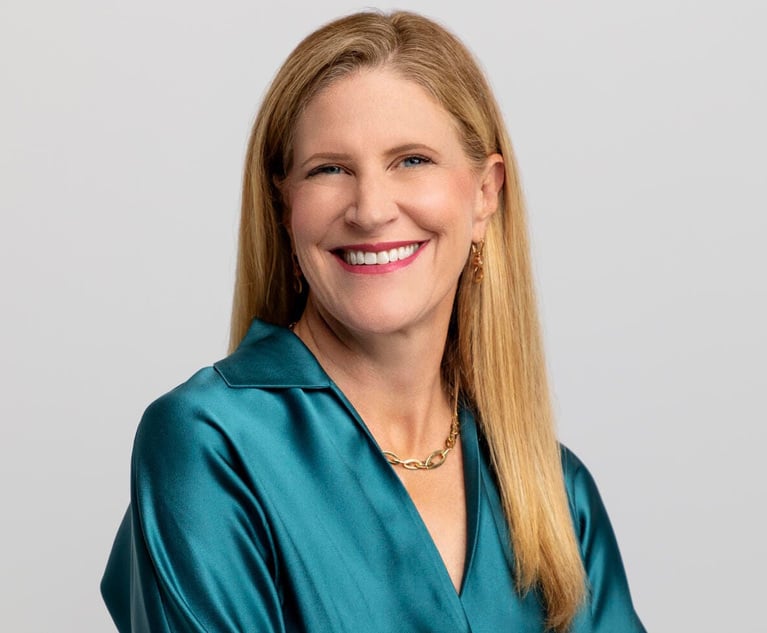General Counsel and Chief Financial Officer Roles, Relationships Are Changing, CPAs Say
GCs and CFOs are taking on more operational and strategic roles, according to CPAs that work with both offices often. That shift has placed the two execs in "a very fluid, open ... closely coordinated role."
August 05, 2019 at 03:53 PM
3 minute read
 (Photo: Pressmaster/Shutterstock)
(Photo: Pressmaster/Shutterstock)
The general counsel and chief financial officer roles and their relationships to each other may be changing.
Both are taking on more strategic and operational responsibilities, certified public accountants who regularly work with GCs and CFOs said. Todd Rahn, a CPA and senior managing director at FTI Consulting, said the roles’ “fundamental shift” from service provider to strategist is in part a “healthy byproduct of [the] stigma” that accounting and legal are cost centers.
“The general counsel and CFO are saying, ‘Hey, we can do that. Meaning I’m not just a cost center. I’m not just a ‘no’ person. I’m somebody who has a tremendously strong professional background, leadership skills. I’m in the C-suite for a reason,’” Rahn said.
He’s increasingly seeing human resources or facilities management report to GCs and CFOs. More are also handling investor communications, he said, and serving as the chief executive officer’s right-hand adviser on general business matters.
Greg Regan, a CPA and partner at Hemming Morse, said it’s crucial there isn’t “friction between those two offices.” In his experience, companies operate best when the “information exchange … causeway between the GC and CFO’s office that [is] opened without traffic.”
“It’s very important that they work very closely with each other. … In case it’s implied that there might be any type of competition, I don’t see that,” Rahn said. “I think in fact, the backgrounds are so distinct, they very much see each other as a really critical resource.”
Their mutual expansion into operations and business strategy have placed GCs and CFOs in “a very fluid, open … closely coordinated role, and that to me is a great step for both,” he added.
Last month, Ideaya Biosciences Inc. named its general counsel to its chief financial officer role. Blackboard Inc. made the same move in June, a sign the two roles have become more closely aligned. The CFO and GC of Boston-based Allied Minds became co-chief executive officers in July.
There are skills general counsel can bring into their collaborations with the CFO to push the business forward and help both execs in their often expanded new roles.
GCs can provide context for regulatory expectations, Regan said, and insight on industrywide best practices developed through their networks. Rahn noted GCs with “empathy,” a “proactive mindset” and a “rock-solid understanding of the business” are likely to have stronger relationships with their CFO.
General counsel can also help CFOs understand changing privacy rules as the CFO role becomes increasingly data-driven. Both CPAs, who are members of the California Society of Certified Public Accountants, said the California Consumer Privacy Act and future similar state privacy laws could lead to more collaboration between the execs.
“I think it’s deepened the relationship. CCPA is a very important change,” Regan said. “[It's] the tip of the spear. … It’s important for the GC’s office to educate the financial personnel and be able to implement appropriate internal controls.”
Read More:
Blackboard General Counsel to Serve as Interim Chief Financial Officer
Ideaya General Counsel Takes on Additional Role of Chief Financial Officer
General Counsel, Chief Financial Officer Take Over as Co-CEOs of Allied Minds
General Counsel Still Being Plucked for Higher C-Suite Roles: July 2019 In-House Moves
This content has been archived. It is available through our partners, LexisNexis® and Bloomberg Law.
To view this content, please continue to their sites.
Not a Lexis Subscriber?
Subscribe Now
Not a Bloomberg Law Subscriber?
Subscribe Now
NOT FOR REPRINT
© 2025 ALM Global, LLC, All Rights Reserved. Request academic re-use from www.copyright.com. All other uses, submit a request to [email protected]. For more information visit Asset & Logo Licensing.
You Might Like
View All
Wells Fargo and Bank of America Agree to Pay Combined $60 Million to Settle SEC Probe

Amex Latest Target as Regulators Scrutinize Whether Credit Card Issuers Deliver on Rewards Promises

Former Capital One Deputy GC Takes Legal Reins of AIG Spinoff
Trending Stories
- 1We the People?
- 2New York-Based Skadden Team Joins White & Case Group in Mexico City for Citigroup Demerger
- 3No Two Wildfires Alike: Lawyers Take Different Legal Strategies in California
- 4Poop-Themed Dog Toy OK as Parody, but Still Tarnished Jack Daniel’s Brand, Court Says
- 5Meet the New President of NY's Association of Trial Court Jurists
Who Got The Work
J. Brugh Lower of Gibbons has entered an appearance for industrial equipment supplier Devco Corporation in a pending trademark infringement lawsuit. The suit, accusing the defendant of selling knock-off Graco products, was filed Dec. 18 in New Jersey District Court by Rivkin Radler on behalf of Graco Inc. and Graco Minnesota. The case, assigned to U.S. District Judge Zahid N. Quraishi, is 3:24-cv-11294, Graco Inc. et al v. Devco Corporation.
Who Got The Work
Rebecca Maller-Stein and Kent A. Yalowitz of Arnold & Porter Kaye Scholer have entered their appearances for Hanaco Venture Capital and its executives, Lior Prosor and David Frankel, in a pending securities lawsuit. The action, filed on Dec. 24 in New York Southern District Court by Zell, Aron & Co. on behalf of Goldeneye Advisors, accuses the defendants of negligently and fraudulently managing the plaintiff's $1 million investment. The case, assigned to U.S. District Judge Vernon S. Broderick, is 1:24-cv-09918, Goldeneye Advisors, LLC v. Hanaco Venture Capital, Ltd. et al.
Who Got The Work
Attorneys from A&O Shearman has stepped in as defense counsel for Toronto-Dominion Bank and other defendants in a pending securities class action. The suit, filed Dec. 11 in New York Southern District Court by Bleichmar Fonti & Auld, accuses the defendants of concealing the bank's 'pervasive' deficiencies in regards to its compliance with the Bank Secrecy Act and the quality of its anti-money laundering controls. The case, assigned to U.S. District Judge Arun Subramanian, is 1:24-cv-09445, Gonzalez v. The Toronto-Dominion Bank et al.
Who Got The Work
Crown Castle International, a Pennsylvania company providing shared communications infrastructure, has turned to Luke D. Wolf of Gordon Rees Scully Mansukhani to fend off a pending breach-of-contract lawsuit. The court action, filed Nov. 25 in Michigan Eastern District Court by Hooper Hathaway PC on behalf of The Town Residences LLC, accuses Crown Castle of failing to transfer approximately $30,000 in utility payments from T-Mobile in breach of a roof-top lease and assignment agreement. The case, assigned to U.S. District Judge Susan K. Declercq, is 2:24-cv-13131, The Town Residences LLC v. T-Mobile US, Inc. et al.
Who Got The Work
Wilfred P. Coronato and Daniel M. Schwartz of McCarter & English have stepped in as defense counsel to Electrolux Home Products Inc. in a pending product liability lawsuit. The court action, filed Nov. 26 in New York Eastern District Court by Poulos Lopiccolo PC and Nagel Rice LLP on behalf of David Stern, alleges that the defendant's refrigerators’ drawers and shelving repeatedly break and fall apart within months after purchase. The case, assigned to U.S. District Judge Joan M. Azrack, is 2:24-cv-08204, Stern v. Electrolux Home Products, Inc.
Featured Firms
Law Offices of Gary Martin Hays & Associates, P.C.
(470) 294-1674
Law Offices of Mark E. Salomone
(857) 444-6468
Smith & Hassler
(713) 739-1250







